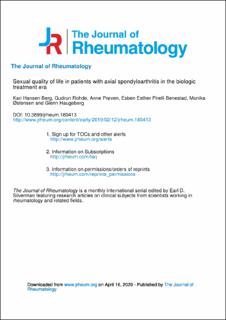Sexual Quality of Life in Patients with Axial Spondyloarthritis in the Biologic Treatment Era
Berg, Kari Hansen; Rohde, Gudrun E.; Prøven, Anne; Benestad, Esben Esther Pirelli; Østensen, Monika Elisabeth; Haugeberg, Glenn
Peer reviewed, Journal article
Accepted version

Åpne
Permanent lenke
https://hdl.handle.net/11250/2651233Utgivelsesdato
2019Metadata
Vis full innførselSamlinger
Sammendrag
Objective. To examine the relationship between demographics, disease-related variables, treatment, and sexual quality of life (SQOL) in men and women with axial spondyloarthritis (axSpA). Methods. AxSpA patients were consecutively recruited from 2 rheumatology outpatient clinics in southern Norway. A broad spectrum of demographics, disease, treatment, and QOL data were systematically collected. SQOL was assessed using the SQOL-Female (SQOL-F) questionnaire (score range 18–108). Appropriate statistical tests were applied for group comparison, and the association between independent variables and SQOL-F was examined using multiple linear regression analysis. Results. A total of 360 (240 men, 120 women) axSpA patients with mean age 45.5 years and disease duration 13.9 years were included. Seventy-eight percent were married/cohabiting, 26.7% were current smokers, 71.0% were employed, 86.0% performed > 1-h exercise per week, and 88.0% were HLA-B27–positive. Mean (SD) values for disease measures were C-reactive protein (CRP) 8.5 (12.1) mg/l, Bath Ankylosing Spondylitis Disease Activity Index 3.1 (2.1), Bath Ankylosing Spondylitis Global Score (BAS-G) 3.8 (2.5), Bath Ankylosing Spondylitis Functional Index 2.7 (2.2), and Health Assessment Questionnaire 0.6 (0.5). The proportion of patients using nonsteroidal antiinflammatory drugs was 44.0%, synthetic disease-modifying antirheumatic drugs (DMARD) 5.0%, and biologic DMARD 24.0%. Mean (SD) total sum score for SQOL was 76.6 (11.3). In multivariate analysis, female sex, increased body mass index, measures reflecting disease activity (BAS-G and CRP), and current biologic treatment were independently associated with a lower SQOL. Conclusion. Our data suggest that inflammation in patients with axSpA even in the biologic treatment era reduces SQOL.